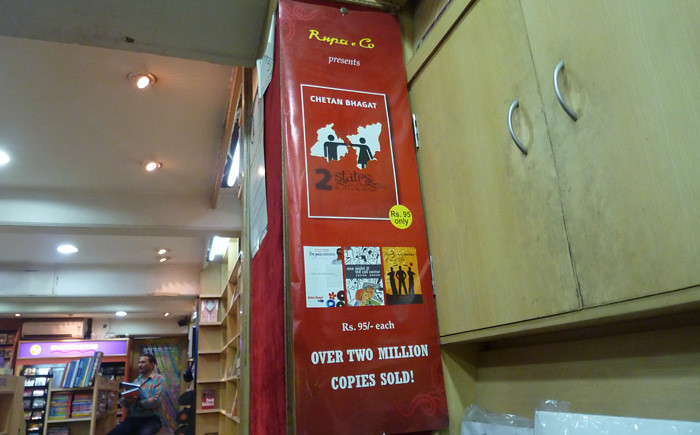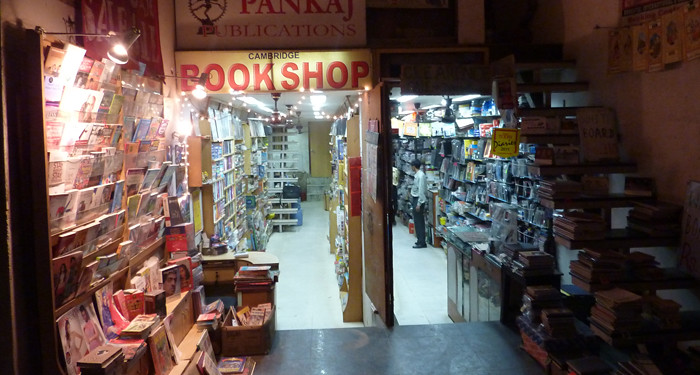Back from India. It was amazing, as ever. Couple of things to talk about. First:
If we’ve ever talked about India and books, you’ll know I’m slightly obsessed with One Night @ The Call Center by Chetan Bhagat. I first read it and wrote about it when I was in India last year, and it’s stayed in my head ever since.

One Night @ The Call Center is about a bunch of young, over-educated kids working in a call center in Gurgaon (which is, trying desperately not to deviate, the new Chiba). Over the course of a single night, they debate issues ranging from arranged marriages to self-harm, industrial relations to globalisation. Then God calls, literally. The Wikipedia page has a good summary, written, charmingly, in Indian English.
You can’t underemphasise the success of this book. It’s the biggest selling English-language book in India. That’s India, a country of 1 billion people, where roughly a quarter are English users, making it technically the second largest English-speaking population in the world, although there are many debates to be had about literacy. What’s not in doubt is that literacy is improving rapidly, with new readers arriving all the time, in their tens of thousands.
One Night @ The Call Center has sold more than a million copies, and you can bet each one of those has been read more than once.

There’s lots of interest here. Bhagat single-handedly created this audience, gambling that there it was there, that kids with the same background as him, hard workers, IIT / IIM aspirants (if not graduates), English speakers, wanted, needed these stories. That the publisher, Rupa, one of India’s oldest home-grown English language publishers, took a gamble on the book. That Bhagat insisted on it being sold for Rs 95, rather than the usual paperback Rs 300 – 500. That it has failed in every other country its been published in, and the movie based on it failed too.
But what’s interesting to me is the tone of the book; what it’s about. Bhagat took out the flourishes before publication (“I realised I can’t be Arundhathi Roy”). It’s defiantly unliterary; it’s unfailingly direct. It’s polemical. Don’t kowtow to your boss, your family, to society. Be the best you can be; for yourself, for your friends, for India (particularly for India: self-determination goes hand-in-hand with nationalism).
First thing I did when I got to Delhi this time; go look for imitators. They had to be there. They were. The one that came to hand was Anirban Bose’s Bombay Girls, Bombay Rains. The formula is the same, if a bit closer to Bhagat’s debut Five Point Someone than One Night…. Five friends (in this case, medical students), a transformative experience, the state of the nation. Characters are dropped in as mouthpieces, shamelessly. The army captain who rages, unexpectedly, against the government: “Democracy doesn’t work at gunpoint. People have to want to be Indian. India is too diverse, too big, to let a few elected representatives and mindless bureaucrats sittlng in Delhi tell everybody else how to think.”
I’m loath to comment too much as an outsider. I know far too little about India, as much as I want to, to comment too much. But these books feel so extraordinary. Young Adult novels, reviled by the literary readership, about the real world, not about vampires or wizards or ponies or socialites. Bose’s editor told me that there’s a huge wave of these books, selling in huge numbers, and they still don’t understand their appeal. Hmm.

They respect books in India, in a way we don’t any more, in Europe and America. They’re also hyper-connected. I want to say something about Network Realism, but I can’t, yet. But these books are big, and getting bigger, because they’re about the specific place, at the specific time, speaking to a specific generation, in their own voice. There is something extraordinary there. That they don’t work as movies or outside India just highlights that.
The books are all in English. “There’s no good writing in Hindi any more”, say my educated friends, “Hasn’t been, for 30 years”. I don’t know if they’re right, but they would know. They lament this, up to a point. Indian English is not my English. It’s not written for us.
Obama was just in India. They were pleased to see him, but they’re aware it’s political, aimed at China. That’s where we think it’s at, for the next century or so: The World’s Largest Democracy (™) versus The World’s Largest… Everything Else—Bhagat himself has a less oppositional view. Time Magazine just called Bhagat one of the 100 most influential people in the world, which is stupid and not wrong at the same time.
I read a number of other books and a lot of other media in the last two weeks. Even the editors of these books don’t understand my or anyone else’s interest in them. But but but. Bhagat has 225k Twitter followers. How could you not be interested in what the kids in India are interested in?
More soon.
Comments are closed. Feel free to email if you have something to say, or leave a trackback from your own site.